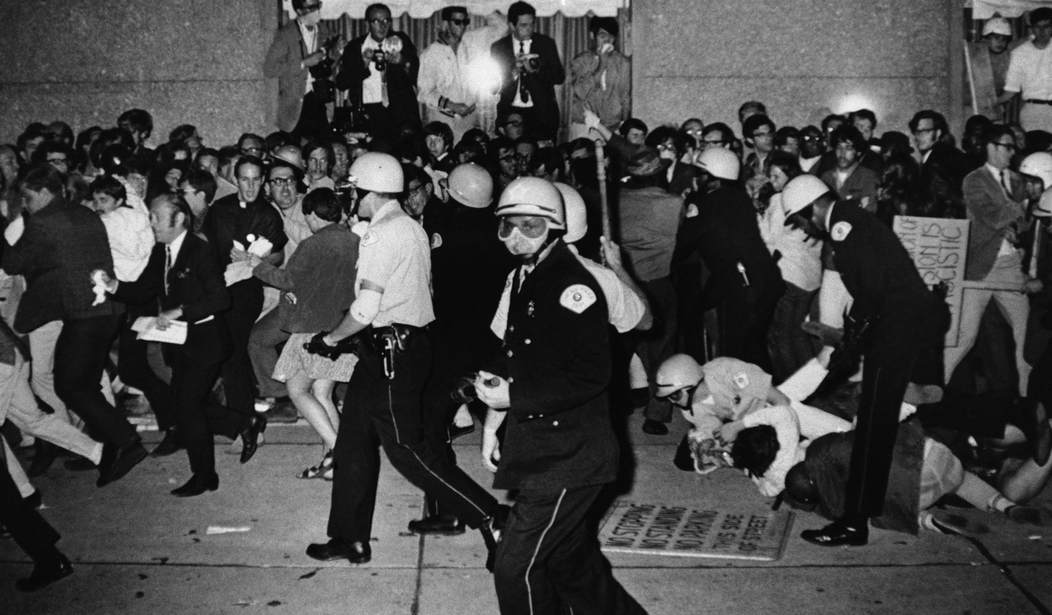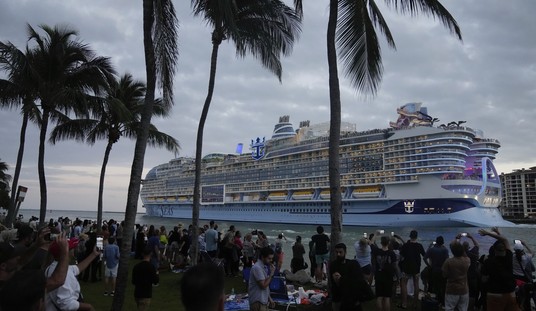The year 1968 was the year I became a politics nerd. At 14 years old, I was just the right age to understand (vaguely) what was going on at the Chicago Democratic Convention and in the world at large. I knew that Vietnam was a mess, the Communists were evil, and hippie girls were really cute.
In those days, a national convention was a huge deal, not the boring, scripted, three-day-long TV show it is today. The convention was working through some huge issues: war and peace, civil rights, and the proper role of government in society. There were actual debates going on and emotions were raw.
Late August in Chicago was brutally hot and humid, adding to the discomfort of convention goers. The 15,000 young people protesting in the streets added a surreal patina to the whole picture, with angry delegates on the inside of the International Amphitheater screaming at each other and angry protesters on the outside of the venue screaming at police.
Suddenly, like a coiled spring unwinding, the TV news showed a phalanx of Chicago police officers in riot gear charging toward their tormentors who had been tossing horse manure, bags of urine, rocks, shards of glass, and anything else that could be thrown at the cops.
By today's standards, the behavior of the police was extremely unprofessional. Training methods have vastly improved since then. But dozens of rioters and cops were injured in the melee.
Inside the hall, Democratic party leaders had voted down a "peace plank" to the platform that would have forced the nominee, Vice President Hubert Humphrey, to virtually surrender to the North Vietnamese once in office. Taking the podium to nominate George McGovern, the eventual 1972 nominee, Connecticut Senator Abe Ribicoff gestured toward Chicago Mayor Richard Daley and uttered the line of the convention: “With George McGovern as president of the United States, we wouldn’t have these Gestapo tactics on the streets of Chicago!”
"The whole world is watching," screamed the protesters. The world didn't matter as much as American voters who were watching. And they got an eyeful.
Rick Perlstein, the author of Nixonland, speaking at an event at Northwestern University’s Medill School of Journalism to mark the Chicago '68 anniversary, cited an NBC news producer who thought the footage he had produced was “a crystalline theatre of moral witness, evil being visited upon innocents”.
But not all saw it like that – a Gallup poll showed 56% of Americans backed the police actions against the demonstrators.
Charles Kaiser, the author of 1968 in America, said: “The biggest impact was on the older generation because they were so completely freaked out by it, this spectacle of anarchy was really terrifying.
This time, the protagonists will be Arabs and pro-Palestinian protesters who, if recent protests are any indication, are going to be aggressive and violent. They will hope for a 1968 repeat. They will do everything possible to provoke that kind of police response.
And there may be as many as 20,000 protesters in the streets to get it done.
“The whole Republican message is, ‘The world is out of control and Biden is not in command,’” said David Axelrod, the Democratic strategist and adviser to former President Barack Obama. “They will exploit any images of disorder to abet and support it.”
If what the pro-Palestinian lobby is promising comes to pass, the Trump campaign may have a lot of images to exploit.
To forestall any such image gallery of chaos and unrest, Chicago's Democratic Mayor Brandon Johnson has refused to issue demonstration permits anywhere near the United Center, where the convention will be held. Police are going to rope off a large area a few miles from the UC, where all protest groups from Save the Whales to pro-Hamas protesters will be penned in where they can scream all they want.
Well. Chicago today has a progressive mayor who not only would never make such an utterance but would not have his police officers’ backs if they ran as fully amok as they did in ’68. But are Chicago’s current cops really all that different from their forebears? And if we’re still providing unconditional aid to an Israel laying waste to what’s left of Gaza, will the demonstrators who do show up be any less frustrated and angry than those of yesteryear?
To be sure, the parties have put in place safeguards to make sure there is never a 1968 again—not by moderating their war policies, but by forcing protesters further and further away from delegates and cameras. Already, protesters who have sought permits to march in Chicago have been given locations that are nearly four miles away from the United Center, the convention site. Protesters were similarly marginalized at the 1996 Chicago DNC, and pretty much every convention thereafter. Groups have called on Mayor Johnson to intervene and ensure a more prominent presence for them.
But the protest location provided, in a bit of symmetry, is Grant Park, where the police riot took place all those years ago. Surely some reporters with cameras, and protesters and passers-by with cellphones, will find their way out there, and document whatever happens.
How successful will the pro-Palestinian protesters be? They have vowed to ignore the permits and march to the UC with or without permission. Chicago police may have "reformed" since 1968, but they're still charged with keeping the peace and enforcing the law.
Those police nightsticks are just as hard today as they were in 1968.








